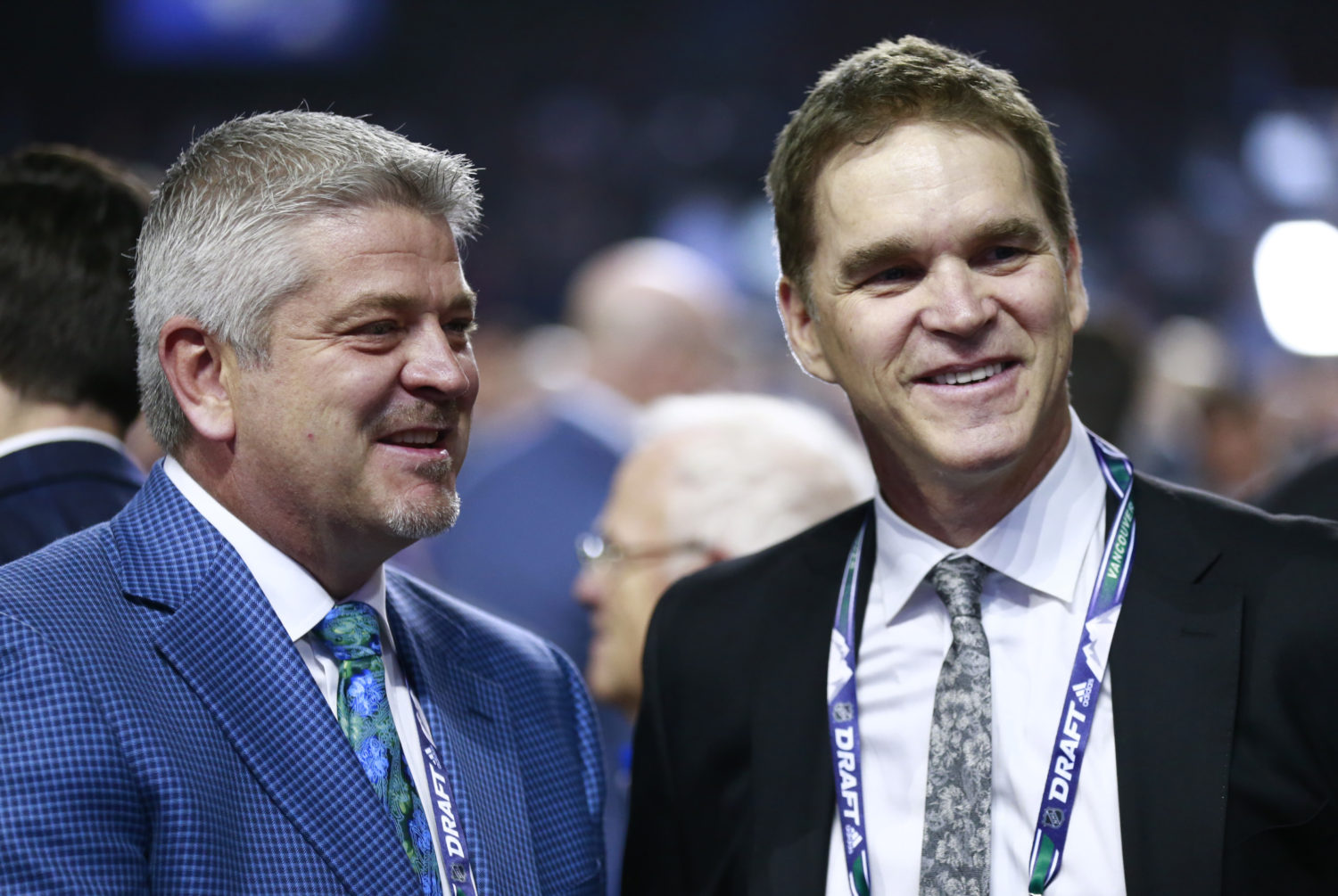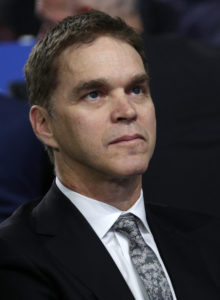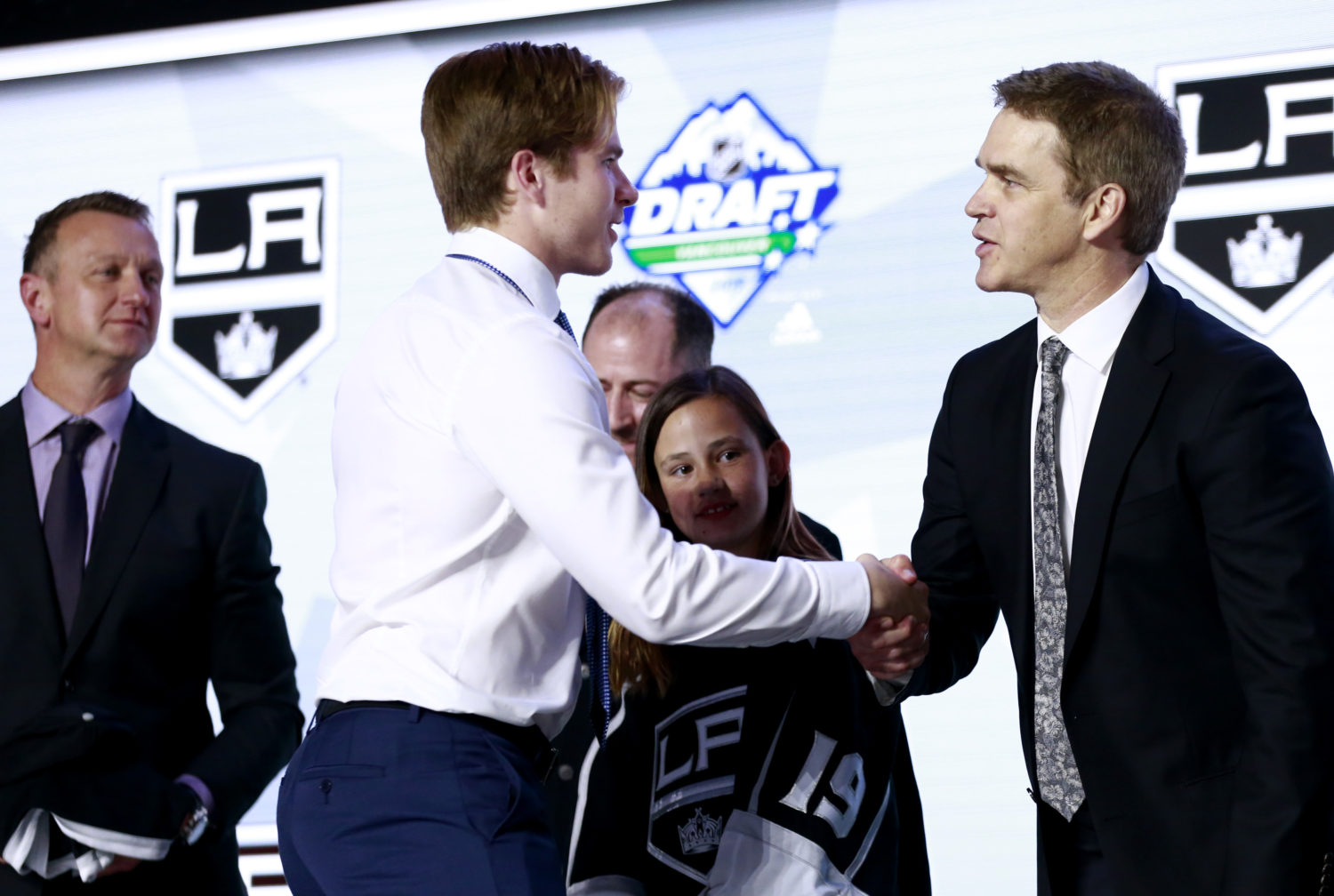Blake Lizotte’s name came up after his strong play had segued from a strong rookie camp to a standout preseason debut. Robitaille had liked Lizotte’s seemingly hyperactive shift-by-shift energy and investment and compared such intensity to Kyle Clifford’s, a player who found a way amidst the rising pace to be an impact and hard player to play against by virtue of his Hockey IQ and how hard he worked. “We need guys that are willing to do that, and if you’ve suddenly got 18 out of 20, you’re going to win a lot of games,” Robitaille said.
On that front, the team’s top 2019 draft pick shouldn’t give him much worry.
“I saw Turcotte play this summer. His first faceoff, he just needed to win that damn faceoff, it meant so much to him,” Robitaille said. “They were winning big at the end, and the last faceoff he took, he was the same. You want that every practice, every shift. That’s why everybody always loves Jaret Anderson-Dolan, because everything is important.”
While replenishing speed and skill remains paramount in a league that continues to get faster, the Kings, as shared by both Robitaille and, earlier in the summer, Rob Blake, still place an extremely high emphasis on drafting for competitiveness and character.
Such a transition takes time. Of the 20 players expected to suit up in tonight’s season-opener, 16 appeared in the final game of last year’s 71-point campaign. Ultimately, those selected in the 2017, 2018 and 2019 drafts will stake their claim to roster spots, a process that happened immediately for 18-year-old Tobias Bjornfot, who was selected 22nd overall in June and with intangibles that often overlap with Turcotte’s.
“Mature beyond his years,” McLellan said of Bjornfot Saturday morning. “…We had a date picked where maybe we’d be sending him back to Sweden, and he missed that flight and he missed the flight the next day, and he still hasn’t gone to the airport, and that has nothing to do with us, it has everything to do with him.”
“I think it’ll be like a pitcher going through the major leagues the first time. You better learn quick at what the batters are doing. But we’re prepared to give him that opportunity. That’s where we are as an organization. We need to let some young players experience growth and some old players recover.”
In our conversation, Robitaille spoke about how the Kings will interpret benchmarks towards the reboot, and how they’ll look to move past an episode in which they “got complacent as an organization.” It’s a good read:
LA Kings Insider: A new, clean slate this year, a fresh start. How are the guys, from the vets down to the rookies, accepting this challenge and learning under Todd?
Luc Robitaille: I don’t know how they’re doing, time will tell, but what I like about it is that the message is clear. It’s clear from Rob, it’s clear from Todd and so far, they’re all asked to compete, they’re all asked to work within the structure, they’re all asked to be great teammates, they’re all asked to follow the path that we want to be on. So, if you think of that, it doesn’t matter what type of player you are. If you compete, you’re coachable, you’re a good teammate, we’re going to have success. That’s what they’re asked, which I really like.
LAKI: Do you chat with team leaders, the leadership committee and the guys that have been here for a long time – the veterans?
LR: Not really. We’ve got to give Todd his role. Rob will talk to some players, but I think it’s really important for Todd to set his tone. I’m going to be here to support him and Rob will support him in the same way, but at the same time, it’s important that Todd sets his tone. I understand how that structure works and it’s very important. For us, when you get all the way up here, it’s important that we set a tone as the organization we want to be, but we’ve got Todd to set that tone in the locker room.
LAKI: When you look at what you want to see from this “refresh” and getting back to where you want this organization to be, what sort of benchmarks are set that you’d like to see accomplished by a certain time? Do you have a general ‘guideline’ of the process?
LR: I think the guideline for me is ‘compete.’ One of the biggest issues we’ve had, is I just think we got complacent as an organization. People talk about the draft we had this year, well even though we looked at skill and speed, the guys that we drafted compete. Then you look and suddenly start talking about those guys, and ‘that’s why they had such a good draft, they got guys that compete.’ At the end of the day there’s no secret, that’s what it takes and that’s the way we want to build this team. We used to talk about, we want guys that it meant something to be a King and I want it to be that way again.
LAKI: As you set the constitution for the way you and Rob would like the team to play, how much do you pick up from other teams – whether it’s St. Louis, whether it’s Washington, whether it’s the LA Kings – that are useful schemes or blueprints towards success?
LR: We could talk about our team when we won – everybody put aside their individual stats for the greater good of the cause. It didn’t matter who was going to score, you just knew everybody played within their role. They all obviously had high end skill, but they played within the role and understood that’s how they were going to win and it worked. I think we need to get back at that.
LAKI: And along those lines, when Todd says that he’ll measure success by ‘growth,’ what beyond ‘compete’ are you looking for that indicate to you that the team is on the right trajectory?
LR: Well, in sports you’ve got to win. You know, it’s that simple. We break down everything, you break down data, puck battles, breakouts, first pass, second pass, power play … but you’ve got to win, you’ve got to find a way to win and that’s going to be growth. I think what Todd’s talking about is if we’re in the right direction and we’re all pulling. If you all do that, you’re going to win enough games if you start doing that and believing.
LAKI: How competitive has the construction of dressing rooms and team spaces become? There’s no salary cap there, you can spend whatever you want to spend.
LR: I think every team’s doing it. I think it’s more the few teams that are not doing it that people know, but I do believe it’s the way you are as an organization on a daily basis. Every single thing that you do on a daily basis, whether it’s for the players, their families and so forth, it takes time, but I always see players talk and people start knowing that you’re doing everything right and we have been doing everything right probably for 20 years, you know? And now, it’s kind of established around the league that the Kings treat their players really well and we’re one of the premier organizations as far as that is concerned. Now, we can’t stop, we can’t take that for granted ever, because it could go away quickly. What we have here this year, what’s being built next door, I don’t think any team’s going to have it. I know Pittsburgh has a clinic, or a hospital in their locker room, but it’s not this performance center. With John Meyer and USC Keck, where players from different sports come to him, I think that’s going to really give us an edge.
LAKI: With China, are there any harbingers towards success that you’ve hit or are looking to hit? How’s that process going?
LR: I’m not sure what kind of benchmark we were looking to hit. We want it to grow. We’re still in that one rink. The league is growing. We needed to establish a relationship and needed to establish the program. I think Todd Elik and his wife did a good job last year. I think Tim Watters is kind of taking it to another level. Having Billy there this summer, it helped. Obviously, Mr. Zhou is a goaltender, so he loved it. But we’re slowly but surely establishing the fact that we’re teaching the game. Even in China, the skill level has been there, but the structure of the game and understanding the game has not, so that’s really where our strength is coming from North America and the stuff that we’re going to send there is going to make more of a difference. Last year was our first year and this year you can clearly see that we’re taking it to another level. But I really think we’ll really know if we’ve made a difference. Hopefully we’ll still there in four or five years, and then we’ll really know. I think it’s almost too soon.
LAKI: What made Ron Hextall an attractive choice to rejoin the organization, and what type of role is he expected to execute?
LR: It’s definitely between Rob and Hexy, but for me, you look at the job he’s done in Philly, he’s done a tremendous job at rebuilding a team. Everybody talks about all their prospects and so forth, so we know he’s had the experience of picking the right guys, and plus he knows the east coast, and I know Rob’s going to use him to do some scouting and work on several projects, so it’s a win for us. The influence he had on our staff and our players here was great, so to have the opportunity to have a guy like that and see where it goes, it’s going to help us.




Rules for Blog Commenting
Repeated violations of the blog rules will result in site bans, commensurate with the nature and number of offenses.
Please flag any comments that violate the site rules for moderation. For immediate problems regarding problematic posts, please email zdooley@lakings.com.